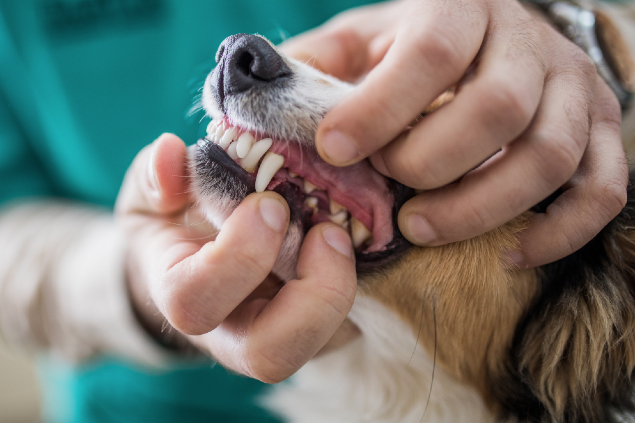
Dental Care for Pets
Oral care is an important part of your pet's overall preventive healthcare program.
Veterinary dentistry services provided by Dr. Sanderlin include cleaning, extraction, and all other aspects of oral health care. Regular dental check-ups and teeth cleanings, combined with good dental hygiene at home, can increase your pet’s health and comfort and add years to his or her life. Just like pet wellness examinations, oral care is an important part of your pet’s overall preventive healthcare program.
If left untreated, dental disease can not only be painful and inhibit proper nutrition, but can also lead to serious health issues that may threaten your pet’s health before symptoms are noticeable. For example, oral bacteria that enters the bloodstream can damage your pet’s kidneys, heart or liver. Proper dental care not only prevents dental and systemic disease, but it also helps minimize the lifetime cost of care for your pet.
Symptoms and Treatment of Dental Issues
The first sign of dental issues in pets is often bad breath. You may also notice redness along the gum line, tartar, calculus, or they may be eating slower or more carefully than they used to. Periodontal disease is the most common ailment of small animals. This begins when bacteria accumulate at the gum line around the tooth. Unless brushed away daily, these bacteria can cause inflammation, bleeding, and if untreated, can cause tooth and/or bone loss.
Veterinary dentistry services provided by Dr. Sanderlin include cleaning, adjustment, filing, extraction, or repair of your pets’ teeth and all other aspects of oral health care. The process begins with an oral exam of your pet’s mouth. X-rays may be needed to evaluate the health of the jaw and the tooth roots below the gumline. Because most dental disease occurs below the gumline, where you can’t see it, a thorough dental cleaning and evaluation are performed under anesthesia. Dental cleaning includes scaling (to remove dental plaque and tartar) and polishing, similar to the process used on your own teeth during your regular dental cleanings.
Annual Checkups Recommended
Your pet’s teeth should be checked at least once a year by your veterinarian for early signs of a problem and to keep your pet’s mouth healthy. Have your pet’s teeth checked sooner if you observe any of the following problems:
- Bad breath
- Broken or loose teeth
- Extra teeth or retained baby teeth
- Teeth that are discolored or covered in tartar
- Abnormal chewing, drooling, or dropping food from the mouth
- Reduced appetite or refusal to eat
- Pain in or around the mouth
- Bleeding from the mouth
- Swelling in the areas surrounding the mouth
Some pets become irritable when they have dental problems, and any changes in your pet’s behavior should prompt a visit to your veterinarian. Always be careful when evaluating your pet’s mouth, because a painful animal may bite.

